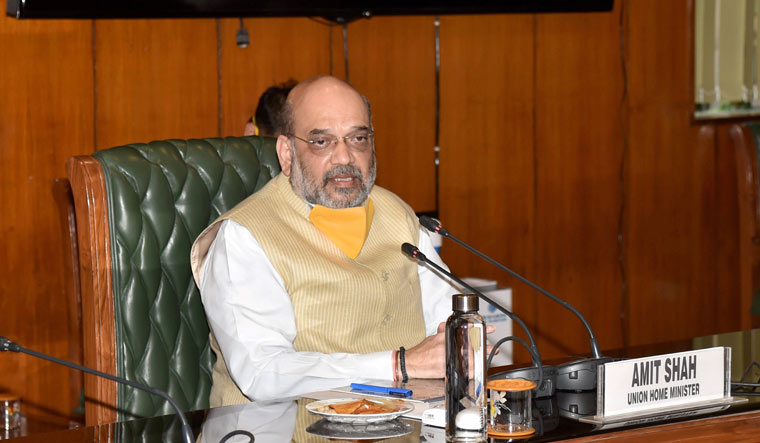Union Home Minister Amit Shah on Thursday favoured a unified strategy for Delhi and NCR to tackle the coronavirus pandemic and said the suburbs like Gurgaon, Noida and Ghaziabad can't be separated from the national capital in this battle.
Shah conveyed this message at a meeting with Delhi Chief Minister Arvind Kejriwal and senior officials to review the COVID-19 situation in Delhi and the National Capital Region (NCR), amidst increasing number of COVID-19 cases in these urban centres.
In view of the structure of Delhi-NCR region, all concerned bodies need to unite and work on a common strategy against the coronavirus pandemic. In this context, I met with Delhi Chief Minister and senior officials of Center and Delhi-NCR today to discuss how to evolve a strategy as soon as possible, Shah tweeted.
Authorities in Haryana, Uttar Pradesh and Delhi imposed border restrictions on different times during the COVID-19 lockdown, leading to inconvenience to many and complaints about difficulty in accessing medical services during the pandemic.
According to a home ministry source Shah said all authorities concerned in Delhi-NCR need to come together in this fight given how closely these cities are linked.
The home minister favoured a unified strategy for Delhi-NCR to tackle the coronavirus, the source said.
Shah said there is a need to scale-up testing for COVID-19 and provide treatment to those found positive.
The home minister also suggested that the NCR districts can consider adopting Rs 2,400 charge fixed for COVID-19 test in Delhi, besides the new rapid antigen methodology being implemented in the national capital from Thursday.
A home ministry statement said Shah also told the meeting that an expert committee decided the rates for COVID-19 beds and treatment in Delhi, and these could be applied to hospitals in the NCR cities after consultations.
He said it would be better to conduct COVID-19 testing through the new rapid antigen methodology approved by the Indian Council of Medical Research (ICMR) which will ramp up the testing capacity and help in early diagnosis and treatment.
He directed officials from Uttar Pradesh and Haryana governments to submit information about COVID-19 beds, ventilators, oxygen cylinders, ICU and ambulances available with them and their plan to augment these resources by July 15 to the Union Home Ministry so that a common strategy can be devised in the NCR in the battle against the virus, the statement said.
Shah assured the NCR districts that the central government will provide all support to them in their fight against the coronavirus pandemic, another source said.
Besides Kejriwal, Delhi Police Commissioner SN Shrivastava, senior officials of NCR districts and Ministries of Home and Health and ICMR attended the meeting.
The NCR comprises districts belonging to Haryana, Uttar Pradesh and Rajasthan. The prominent ones being Gurgaon, Faridabad (both in Haryana), Gautam Buddha Nagar (Noida) and Ghaziabad (both Uttar Pradesh).
The home minister had a series of meetings with Delhi Lieutenant Governor Anil Baijal, Chief Minister Kejriwal and senior officials in last four days to strengthen the health infrastructure in Delhi.
Shah had also visited the national capital's LNJP Hospital on Monday and took stock of its healthcare facilities and gave necessary instructions for improvement.
The Central government is also targeting to conduct six lakh COVID-19 tests in Delhi through the new rapid antigen methodology in 169 new facilities being set up in the capital for which 50,000 kits have been made available already.
On June 12, the Supreme Court asked the Uttar Pradesh government to explain the guidelines issued by the Noida administration on institutional quarantine, observing they are not in "conformity" with the national guidelines.
"There cannot be a guideline contrary to the national guidelines," the court had said, adding, that any directive contrary to the national or state guidelines might lead to chaos.
On June 4, the Supreme Court had asked the Centre to convene a meeting of Delhi, Uttar Pradesh and Haryana for easing interstate movement at all borders in the NCR.
It also observed that there should be a consistent policy in this regard for the NCR.
The Centre informed the apex court that the union home secretary had convened a joint meeting on June 9 with chief secretaries of Delhi, Uttar Pradesh and Haryana to deal with the issue and now there was no barrier on these borders.
India's total COVID-19 cases reached 3,66,946 on Thursday morning, while the death toll climbed to 12,237.
The number of active cases stands at 1,60,384 while 1,94,324 people have recovered, thus, around 52.95 per cent patients have recovered so far.



